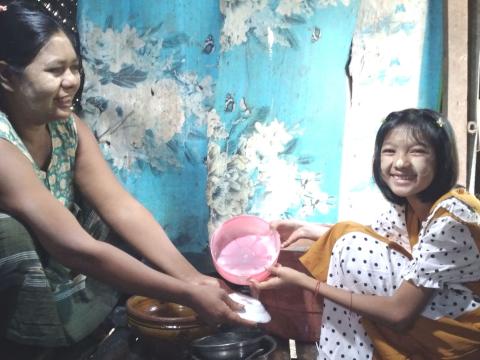Thazin’s path to purpose and self-worth

Thazin, a 12-year-old girl from East Pay Chaung village, lives just 30 minutes from Bogale township. Thazin is in sixth grade, with two sisters—a 16-year-old in grade 10 and a 5-year-old in kindergarten. Her father works hard as a farmer, and her mother sells traditional Myanmar snacks during school hours to help with extra income. Despite their efforts, Thazin’s family lives with modest means, making ends meet but without any financial cushion.
At times, Thazin felt frustrated and even embarrassed by her family’s financial limitations. She often compared herself to wealthier classmates, feeling discontent with the 1,000 kyats (0.25 USD) her mother could afford to give her for snacks. Spending it quickly, she would ask for more, leading to tension and misunderstandings at home. Thazin struggled in her studies and found it hard to balance her responsibilities at home, which affected her grades and her relationship with her family.
"I struggled to balance my responsibilities as a student and as a daughter," Thazin shared. "At times, I felt so frustrated with myself and the situation. I even wondered, 'Why is this happening to me?'"
With the encouragement of her parents and trained facilitators from World Vision, Thazin decided to join the organisation’s awareness sessions held in her village. These programmes are designed to help children build healthier relationships, manage emotions, and develop essential life skills. One of the sessions, Dare to Discover (D2D)[1]—conducted with the involvement of local faith leaders—helped children explore their sense of identity, self-worth, and purpose.
After more than a year of attending the D2D session and others, Thazin began to blossom. She gained a better understanding of her own identity and her family’s struggles.
“I learned to appreciate my family and understand who I am,” Thazin shared. “I used to be upset about our financial situation but now I realize it doesn’t matter what kind of family you’re born into. Everyone deserves to love and to be loved. And everyone should respect themselves and their family.”
Inspired by this new outlook, Thazin started saving half of her daily allowance, recognizing the sacrifices her parents made for their three daughters. Her mother quickly noticed the changes: “Thazin began helping with household chores and focusing more on her studies. She even used her savings to buy school supplies and small gifts for her younger sister. She has really lightened our load.”
Today, Thazin is viewed as a role model in her village. Parents appreciate her kindness and patience, and they feel comfortable with their children spending time with her. Thazin dreams of becoming a community volunteer, teaching and sharing what she’s learned with younger children. “It makes me happy when other parents trust their kids with me,” she said with pride.
Thanks to the Spiritual Nurture of Children project, Thazin’s journey has transformed her life and positively impacted her family and community. Her family feels a deep gratitude for the project’s role in strengthening their relationships and inspiring hope for the future.
“Train up a child in the way he should go, and when he is old, he will not depart from it.” (Proverbs 22:6)
The Spiritual Nurture of Children project, led by World Vision Myanmar in Bogale, is a three-year initiative running from FY 23 to FY 25, aiming to support children’s holistic growth and sense of identity. In FY 24, the project engaged a total of 4,026 participants, including 2,167 faith leaders and parents, as well as 1,859 children. Through this programme, children receive education on critical issues like child protection, child marriage, reproductive health, life skills, and online safety, along with spiritual activities that guide them toward self-discovery and purpose.
In addition, the project offers specialized sessions for faith leaders and parents, covering child protection and participation models and themes such as celebrating families, positive discipline, the Channel of Hope, child marriage, reproductive health, online safety, and mental health and psychosocial support (MHPSS).
[1] D2D: Implemented with faith leaders, this approach seeks to create positive dialogues with children to address social practices that affect them and thus influence communities for their betterment. D2D helps young people explore their sense of purpose and build confidence by offering workshops that promote understanding, love, and hope. It supports children’s programmes by adding value to their education and personal growth.